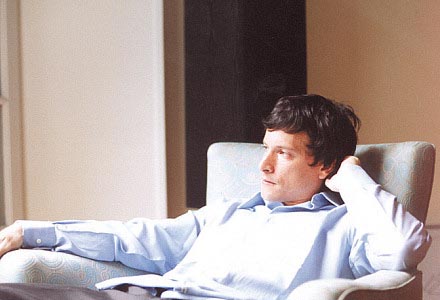ANTONIO BIRABENT
PEOPLEText: Gisella Lifchitz
Antonio folds carefully the napkin in which he’s been drawing scribbles during the last hour, and while putting it in his pocket, he gets up and asks me to join him. His suggestion seems natural to me and we leave the bar together. The bar has already changed. There are no lawyers or judges or Recoleta people anymore. Now the bar is friendly because AB conquered me to his lines. A few steps from there we hear the waiter’s call, with my handbag in his hand. I’ve left it in the chair, obviously.
AB goes back, holds it, gives it to me, I look at him and say “I don’t care for material stuff”. He smiles weakly, I sigh, we keep going. And the conversation continues while we cross streets, then he warns me about a taxi that almost hits me, people watch us, we enter the Bank, I wait for him in the row, he changes some money, he has a life.
We go to his place and he gives me the album while I wait for him at the front door. I try to escape from reality and listen to a song in my walkman, but he arrives soon and he approaches me, we say goodbye and he waves at me, tasting my name in his mouth. I walk away wondering about the slightest possibility of having took off with him. At least this time.

Although when he was little music ran through his veins, AB did also some acting. Some of his works were films “Tango Feroz” (Rough Tango), “Pequenos Milagros” (Little Miracles), “El Impostor” (The Fake) and “Lisboa”, and the TV series “Verdad/Consecuencia” (Truth or Dare) and “Un Mundo de Sensaciones” (A world of Sensations). Between 1993 and 1996 he edited two records: “Todo este tiempo” (All this time) and “Morir y Matar” (To Die and to Kill). Then he got through independent period during which he settled in Madrid. There he edited “Azar” (Chance), “Ep” (unpublished in Argentina), “Anatomia” (Anatomy) and “Anatomix”.
When we get closer to AB, we can find in him a recurring identification with the oriental culture. It shows off in his songs “Aishiteru”, “Eight Chinese girls” and “Oriental Princess”, for instance. It flows also inside his almond-shaped eyes and his calm philosophy. AB dreams with a trip towards a Japanese beach where nothing else matters.
In “Oriental Princess” we perceive a certain tranquillity where one could easily rest. Nothing urges him too much in this eternal dream. Maybe the last sentence resumes the leit-motiv of his way through music and life. “It’ s so hard to be standard”, he says between resignation and moan. We keep listening him even long after he quits singing.
“Aishiteru” (I love you) is a song which Birabent composed after his girlfriend went to Japan and told him stories from her trip. He found in that Japanese word the feeling he identifies with. It reflects the nostalgia of love that remains just a short time before fading away. That word itself carries the germ of her own disappearance, and returns like pure memory.
In video clip of song “Today”, Birabent is white. Everything around him is white too: the hospital, the surgical instruments, the lighting, even the song itself. From the singer’s point of view, the first idea they had in mind was the story of a couple that enters a high tech clinic to get a cure for lack of affection. However, he came to the conclusion that it’d be very pretentious to tell such a story in a three minute video clip.
“That would be more like a David Lynch movie. I’m happy with the results of the clip. The story remains open, but it’s ok,” he says truly relieved. “I find in video clips a relaxed place, where I’m not totally responsible for what happens. I’m not the captain of the ship anymore”.
Text: Gisella Lifchitz




